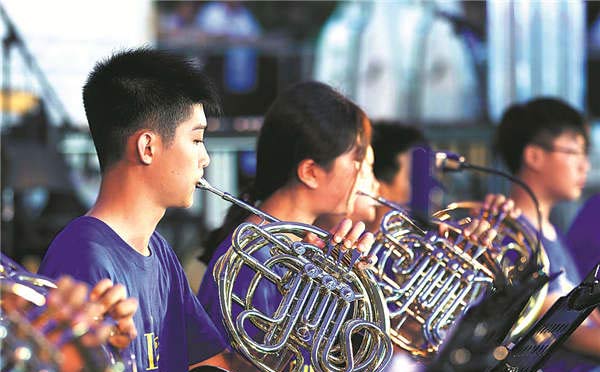Talking in a common language


Some 500 musicians from 20 orchestras attend the first Eurochestries Festival held in China, including the Golden Sails Symphony Orchestra of Beijing No 8 Middle School, Trio Sonata from Mexico, Chinese and French conductors Liu Zheng and Revolte Claude, the CasaSawt Choir from Morocco, and the brass quintet of the Bergen Philharmonic Orchestra of Norway. [Photo by Verde Yang/For China Daily]
Young musicians from 13 countries recently gathered in Qingdao for the first Eurochestries Festival held in China. Chen Nan reports.
Suit and tie, violin, homework, Zhang Muxiang can still vividly recall repeating to himself the three most important things he had to take with him on a trip to Quebec during his summer vacation in 2012.
Then 11, he was nervous as it would be his first trip abroad without his parents. He was also excited because along with about 50 members of the Golden Sails Symphony Orchestra of Beijing No 8 Middle School, Zhang was going to perform for the first time at the Eurochestries Festival, one of the world's largest youth classical music exchange platforms.
"The summer vacation in Quebec was unforgettable," says Zhang, now 17. "I am still in contact with the conductor we worked with in 2012."
Back in 2012, he was the youngest member of the orchestra; now he is the oldest and the orchestra's principal violinist.
He recently performed with the Golden Sails Symphony Orchestra at the first Eurochestries Festival held in China.
"I was really excited that the festival came to China this year. It enabled me to share music with so many musicians in what is my last year with the orchestra," says Zhang, who will graduate from Beijing No 8 Middle School next summer.
Held in Qingdao, Shandong province, from July 26 to Aug 5, the Eurochestries Festival attracted 20 orchestras from 13 countries, including the CasaSawt Choir from Morocco, the Choir of the University of Wroclaw from Poland and Beijing Philharmonic Symphony Orchestra, who staged a total of 26 concerts across the coastal city.
At the festival amateur student musicians from China, including the Peking University String Quartet and the Zhi Xing Brass Quintet from Renmin University of China, also shared the stage with professional symphony orchestras.
They performed at various places, from indoor concert halls to outdoor venues.
"It was very inspiring for me as I have decided to pursue a professional career in Germany after graduation," says Zhang, who was introduced to music by his parents, both bank clerks, and started learning violin at 3.
Torstein Holmaas, the trumpet player with the brass quintet of the Bergen Philharmonic Orchestra of Norway, spent 24 hours traveling from Bergen to Qingdao. "I am delighted to come all the way here to perform in China, for the first time," he says.
The brass quintet performed a concert, playing classic songs from Norway, as well as collaborating with Chinese musicians at the closing ceremony.
"The level of young Chinese musicians is very high and they are easy to play with. Though it's difficult to communicate through language, we are good at using body language and we can understand each other when we perform music together."
The Eurochestries Festival was founded in 1989 by French composer and chorus conductor Marcel Corneloup to promote the orchestral practice of young musicians aged 15 to 25, through international exchanges.
In early 2016, Beijing-based violinist and conductor Liu Zheng made a proposal to the committee of the festival to bring it to China annually.
Having participated in several Eurochestries festivals held across the Europe, Liu, who studied music at the University of Music and Performing Arts Vienna from 2000 to 2003, wanted to organize a festival in his home country with an aim of bringing wider music exposure to Chinese students.
"I was impressed by the atmosphere of the music festival when I went there for the first time in 2000. The musicians from different countries not only performed together but also lived together, like a summer camp," recalls Liu. "I took some Chinese symphony orchestras to Eurochestries festivals but I wanted more young Chinese musicians to experience the festival and benefit from it."
For the first Eurochestries Festival in China, Liu wanted to showcase young musicians playing music from their own countries.
But he also drew up schedules for musicians from different countries to perform together under the baton of conductors from yet another country.
"It was challenging because the number of musicians was large (500 in all) but they are very disciplined and devoted to this project, despite the cultural and language differences," Liu says, adding, "Music unites people."
Between 2005 to 2012, the Golden Sails Symphony Orchestra of Beijing No 8 Middle School, founded in 2002, performed at the Eurochestries Festival four times, playing music pieces ranging from Torch Festival by Chinese composer Wang Xilin, which was inspired by the ethnic music of Yunnan province, to waltzes by Johann Strauss II.
During the festival held in Qingdao this year, the orchestra played pieces, including the second movement from Dmitri Shostakovich's Symphony No 10.
"The students challenged themselves successfully with very demanding music pieces," says Liu Lu, conductor and music teacher of the orchestra, who graduated from the Central Conservatory of Music with a conducting major and joined in the orchestra in 2005.
"But it's not just about music. It teaches the students how to accomplish things and how to communicate."







